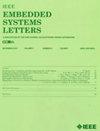MQTT-Based Adaptive Estimation Over Distributed Network Using Raspberry Pi Pico W
IF 2
4区 计算机科学
Q3 COMPUTER SCIENCE, HARDWARE & ARCHITECTURE
引用次数: 0
Abstract
As the demand for edge computing applications continues to rise, the need for efficient training of resource-constrained devices becomes paramount. This letter proposes message queuing telemetry transport (MQTT)-based implementation of distributed estimation strategies in the context of the Internet of Things (IoT), namely incremental, consensus, and diffusion strategies. The use of Raspberry Pi Pico W in the emulation environment is motivated by its advanced capability, while the MQTT data protocol is employed to address the constraints associated with conventional HTTP/HTTPs protocols. Synchronization in an IoT network is achieved by the integration of a novel methodology that entails the use of the wait-for-slowest (WFS) protocol and the MQTT protocol. Furthermore, the development of a graphical user interface supported by the Django application allows for adjusting parameters in distributed strategies through the HTTP REST API, along with SQLite. The results acquired from hardware experiments exhibit a strong correlation between the mean-square performance achieved from simulation studies. The distributed estimation strategy is compared with state-of-the art centralized and noncooperation estimation strategies, demonstrating its superior performance. In addition, a study is conducted on the resilience of these IoT networks in the face of several network threats, such as node failure and model poisoning attacks. A theoretical analysis is provided to explain the relationship between the number of iterations and node failure.基于mqtt的分布式网络自适应估计
随着对边缘计算应用程序的需求不断增加,对资源受限设备进行有效培训的需求变得至关重要。这封信提出了基于消息队列遥测传输(MQTT)的分布式估计策略在物联网(IoT)背景下的实现,即增量、共识和扩散策略。在仿真环境中使用Raspberry Pi Pico W是由其高级功能驱动的,而MQTT数据协议用于解决与传统HTTP/HTTPs协议相关的约束。物联网网络中的同步是通过集成一种新方法实现的,该方法需要使用等待最慢(WFS)协议和MQTT协议。此外,Django应用程序支持图形用户界面的开发,允许通过HTTP REST API和SQLite调整分布式策略中的参数。从硬件实验得到的结果表明,从仿真研究中获得的均方性能之间存在很强的相关性。将分布式估计策略与当前的集中式和非合作估计策略进行了比较,证明了其优越的性能。此外,还研究了这些物联网网络在面对节点故障和模型中毒攻击等几种网络威胁时的弹性。对迭代次数与节点失效之间的关系进行了理论分析。
本文章由计算机程序翻译,如有差异,请以英文原文为准。
求助全文
约1分钟内获得全文
求助全文
来源期刊

IEEE Embedded Systems Letters
Engineering-Control and Systems Engineering
CiteScore
3.30
自引率
0.00%
发文量
65
期刊介绍:
The IEEE Embedded Systems Letters (ESL), provides a forum for rapid dissemination of latest technical advances in embedded systems and related areas in embedded software. The emphasis is on models, methods, and tools that ensure secure, correct, efficient and robust design of embedded systems and their applications.
 求助内容:
求助内容: 应助结果提醒方式:
应助结果提醒方式:


